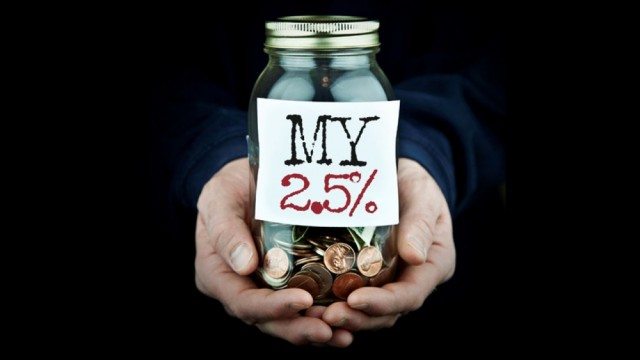How Do I Determine How Much Zakat I Owe?
Hanafi Fiqh
Answered by Sidi Wasim Shiliwala
Question: Assalamu alaikum. I have a question regarding unpaid zakat. I estimate that I earned 141,000 USD before taxes over a 3.5 year period, broken down like this:
year 1: $24,000
year 2: $35,000
year3: $70,000
Do I have to pay 2.5% on that total amount of $141,000?
Answer: Walaikum As-salaam wa Rahmatullahi wa Barakatuhu,
May Allah reward you for being concerned about the zakat you owe. I will try my best to walk you through the process of calculating your zakat, which you can then use to figure out how much you owe.
The Basics of Zakat
Zakat is obligatory (fard) upon every legally responsible (i.e. a sane adult) Muslim who possesses the nisab (minimum zakatable amount) for one whole lunar year. The zakatable amount is counted from monetary wealth and trade goods while excluding basic living needs (house, furniture, clothing, vehicles, etc.). Furthermore, debts are subtracted from this amount, such that if one has $1000 more than the nisab but is in debt for $1500, they do not have to pay zakat.
*The current nisab value can be found at http://www.e-nisab.com/
Estimating a Zakat Due-Date
Based on the above definition, you first owed zakat one year after you first came into possession of more than the nisab amount (around $4925 as of April 2012). Since you do not know for sure when this happened, you should try to establish this date based on your best estimation. Perhaps looking into your bank records will help.
If you accumulated your nisab after you started working, then think about how much you made per paycheck, and how much of that you normally spent versus how much you kept, and then calculate from that when you surpassed the nisab. Your first due-date for zakat, then, would be one lunar year from that date.
You can use the following tool to calculate the (approximate) Islamic lunar calendar date from a specific Gregorian calendar date (and vice versa): http://www.islamicfinder.org/Hcal/index.php
Paying Each Year
Estimating your zakat due-date is important because it will prove a vital reference point for calculating zakat amounts for years that you missed paying it. Once you figure out the due-date, you now have to determine (or use your best estimation) how much money you had to pay zakat on every year on that date.
Once you have settled upon a date, even if it is an estimate, there is no further need to worry about it. The main takeaway is to do your best in estimating a starting point, and then being consistent in paying your zakat based on that date thereafter.
Sample Case
So, for example, Hassan needs to pay zakat for the past 3 years.
First, he estimates his zakat due date to be the 20th of Dhul Qa`idah.
Second, because his financial records are in Gregorian Dates, he determines the Gregorian Zakat Due-Dates for the past 3 lunar years: 1) November 8th, 2009; 2) October 28, 2010; and 3) October 18th, 2011
Third, he uses his financial records to estimate how much money he had to pay zakat on for those dates:
1) 11/08/2009: $23,000; 2) 10/28/2010: $27,000; 3) 10/18/2011: $31,000
Finally, he calculates the zakat he owes by multiplying 2.5% to each amount and adding them:
Year 1: 23000 x .025 = $575; Year 2: 27000 x .025 = $675; Year 3: 31000 x .025 = $775; Total: 575 + 675 + 775 = $2025
Your Situation
So in order for you to get a clear idea of how much zakat you owe, you need to:
1) Determine or estimate your zakat due-dates for the years you missed.
2) Determine or estimate the amount of zakatable money you had on each of those dates. Remember that what matters is not how much you earned over those 3.5 years, but how much zakatable money you possessed on the dates when it was due.
3) Multiply these amounts by 2.5% and then add them together to find your total owed zakat. I would encourage you to add a little more to this amount out of precaution, perhaps by increasing your zakat an additional 3%. (In the above case, that would mean Hassan pays $2085 instead of the initial $2025)
4) Give this amount in zakat over time and in amounts that are manageable. It does not have be paid immediately, especially if doing so would entail hardship.
More Information on Zakat
For more advice on matters related to zakat and financial planning, I encourage you to take the course “Money Matters” here at SeekersGuidance. You can also look to the following answers for some more information and advice:
Years of Past Due Zakat, and Zakat on Non-Selling or Damaged Trade Goods
Zakat Questions: Resetting Start Date, Miscalculations, and Debt Deduction
Is Zakat Due on Savings for Which Zakat was Paid the Previous Year?
Zakat: How to Calculate & Whom to Give
May Allah give us all the tawfiq to fulfill our rights and duties in this world so that it may benefit us in the next.
Jazakum Allahu Khairan,
-Wasim
Checked & Approved by Faraz Rabbani
